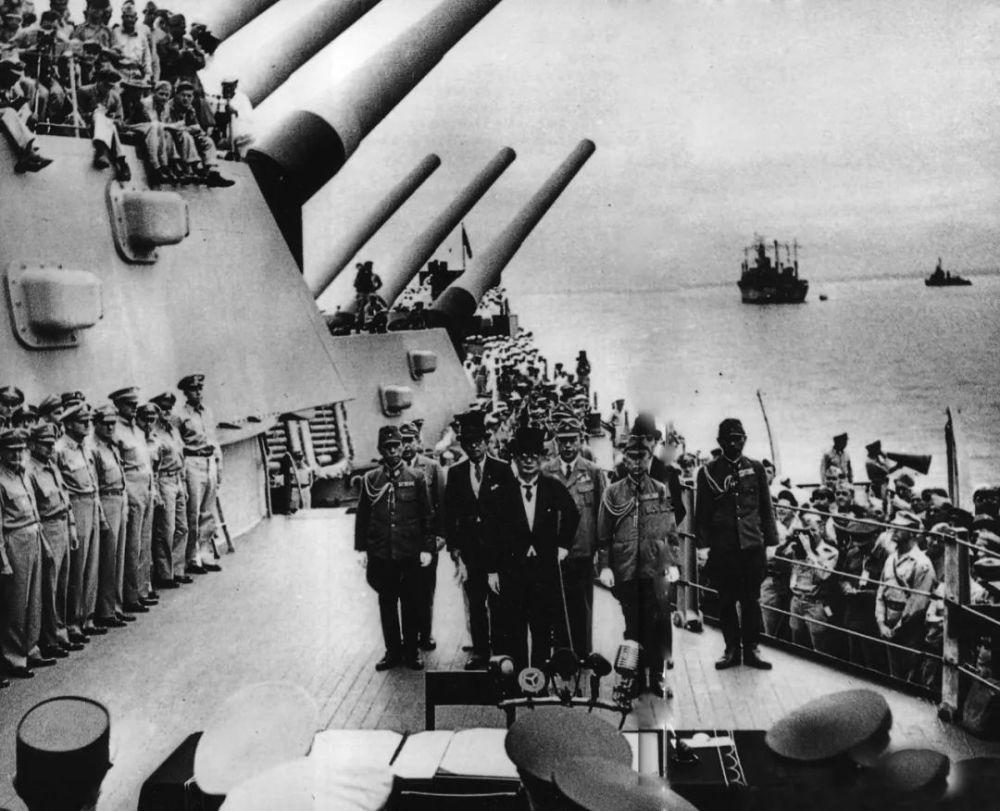We read all the lead to present a different history.
September 2, 1945, was a day to celebrate, when the Chinese military and civilians won the victory of the eight-year War of Resistance and drove the invaders out of the country. In fact, on August 15, under the blows of the righteous divisions of the whole world, the Japanese Emperor announced unconditional surrender and issued an "edict of the end of the war" to announce unconditional surrender. On August 21, in Zhijiang, Hunan, the Japanese envoy submitted a surrender letter to the Nationalist army, and handed over the deployment map of the Chinese troops and the list of generals.
On September 2, 1945, in Tokyo Bay, Japan, the battleship USS Missouri was formally signed to the United States and Britain in the instrument of surrender. The United States was MacArthur who attended the ceremony of the surrender of the Japanese army, which also included the Chinese soldier General Xu Yongchang.

Then, in China, the surrender ceremony was also held, known in history as the Surrender Ceremony of the Chinese Theater, on September 9, 1945, at the address of the Nanjing Army Officer School Auditorium. At that time, the Japanese army submitted the surrender letter to the Nationalist army as the commander-in-chief of the dispatch army, Okamura Ninji, who was also a notorious war element. The representative of the Nationalist army to accept the surrender of the Japanese army was He Yingqin, and the ceremony lasted 15 minutes, indicating unconditional surrender and signing the surrender instrument.
Although the surrender time is very short, the Chinese military and civilians have paid eight years for these 15 minutes, and at the same time paid a heavy price to win the 15-minute surrender ceremony. At that time, in addition to Nanjing, Chiang Kai-shek divided the Chinese theater into fifteen surrendered areas, and He Yingqin served as plenipotentiary. Then, as such an important moment, and the surrender ceremony that the whole country and the whole world are concerned about, why did Chiang Kai-shek choose to let He Yingqin represent the Nationalist army and accept the surrender ceremony of the Japanese army, and why did he himself not attend this glorious moment?
In fact, at that time, many senior generals of the Nationalist army suggested that Chiang Kai-shek attend this important historical moment, and if Chiang Kai-shek had attended, there would certainly have been nothing to be admired. But Chiang Kai-shek thought about it and refused, the first reason: he was the head of state of a country, and the other party (Okamura Ninji) was only a general, and if Chiang Kai-shek attended, he would definitely lose his identity, plus. He himself is a winner, and if he attends, he is not too much for the other side.
Moreover, at that time, the United States, Britain, the Soviet Union and other countries all sent generals to attend the surrender ceremony, and did not say which head of state attended such an event. Therefore, Chiang Kai-shek cannot set such a precedent, and if he really attends, is it not a punch in the face for himself?
In the end, it was decided that He Yingqin would come to Nanjing on his behalf to preside over the surrender ceremony of the Japanese army. Why Ho Ying Chin! Instead of Chen Cheng, you must know that Chen Cheng was known as the chairman of the small committee during the War of Resistance Against Japanese Aggression. With such a faceless thing, How could Chiang Kai-shek think of his own people?
The first reason, during the War of Resistance Against Japanese Aggression, He Yingqin's status should be said to be a little higher than Chen Cheng's. It was only after the end of the War of Resistance Against Japanese Aggression that He Yingqin was slowly snubbed by Chiang Kai-shek, and his position in the Nationalist army also plummeted.
The second original regiment, He Yingqin, was the commander of the Chinese Theater Army, a first-class general, and the Japanese general Okamura Ningji, with the same position and rank, he was the most suitable to attend, and did not lose his identity.
As soon as the third original regiment ended the War of Resistance Against Japanese Aggression, Chiang Kai-shek proposed that he should not remember the old evils against the Japanese army and should repay his grievances with virtue, while He Yingqin and Okamura Ningji were old friends and classmates, and it was more convenient to deal with matters related to surrender and handover. It should be noted that after Emperor Hirohito announced his unconditional surrender, many senior Japanese generals were unwilling to accept this fact and continued to resist.
Based on the above reasons, Jiang decided that He Yingqin would preside over this great ceremony of surrender, which was very concerned by the whole world, and did not choose to let Chen Cheng, or himself attend.